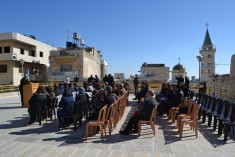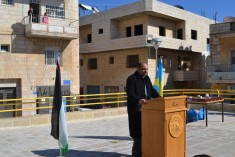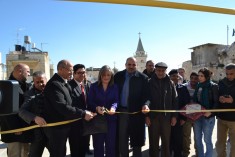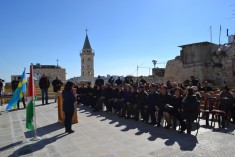Mrs. Rula Ma’aia, Eng. Willian Sha’er deputy mayor of Beit Jala, Mr. Amhad Junaid Sorosh-Wali Head of Culture Unit, Mr. Fuad Salem General director of Bethlehem governorate, Lieutenant Adnan Nayef, Clerics of Beit Jala, and number of organizations representative and local community attended the event.
 Eng. Sha’er praised the role of each of the Swedish government, UNESCO, the owners of the building and the CCHP for its efforts in reviving the heritage and preserving our cultural identity and contributing to job creation, especially in the historic town of Beit Jala, stressing on the importance of this particular project in solving crisis in the historic centre of Beit Jala by creating a public open space and parking.
Eng. Sha’er praised the role of each of the Swedish government, UNESCO, the owners of the building and the CCHP for its efforts in reviving the heritage and preserving our cultural identity and contributing to job creation, especially in the historic town of Beit Jala, stressing on the importance of this particular project in solving crisis in the historic centre of Beit Jala by creating a public open space and parking.
 Arch. Issam Juha, director of CCHP welcomed the honorable guests and pointed out that this project is a complement to the rehabilitation interventions to revive the historic town of Beit Jala and give it a touch of aesthetic and develop tourism. Arch. Juha thanked MOTA, Beit Jala Municipality, Governorate, and Swedish government, UNESCO, , project contractor, and CCHP staff for their continuous efforts in preserving the cultural heritage, especially Arch. Mohammed Kattoush the project’s supervisor.
Arch. Issam Juha, director of CCHP welcomed the honorable guests and pointed out that this project is a complement to the rehabilitation interventions to revive the historic town of Beit Jala and give it a touch of aesthetic and develop tourism. Arch. Juha thanked MOTA, Beit Jala Municipality, Governorate, and Swedish government, UNESCO, , project contractor, and CCHP staff for their continuous efforts in preserving the cultural heritage, especially Arch. Mohammed Kattoush the project’s supervisor.
In turn, Mr. Juneid pointed to the importance of these projects in contributing to preserving cultural heritage which reflects the civilization and culture of the Palestinian people. As well, he expressed his joy for being in Beit Jala and observe the preservation initiatives of the historic town based on the partnership and coopration.
 In conclusion, H.E. Ma’aia expressed her delight to inaugurate such project, and thanked the Swedish government through UNESCO for its continuous support for infrastructure projects and traditional buildings to be used for productive, social, cultural and health purposes. She also praised the efforts of CCHP since 2001 in this area, and in providing opportunities for temporary and permanent jobs and adapting buildings for community service, pointing out to the CCHP efforts and challenge in adapting Dar Kawwas Building (previously SOS School) to be the new and main locale of MoTA.
In conclusion, H.E. Ma’aia expressed her delight to inaugurate such project, and thanked the Swedish government through UNESCO for its continuous support for infrastructure projects and traditional buildings to be used for productive, social, cultural and health purposes. She also praised the efforts of CCHP since 2001 in this area, and in providing opportunities for temporary and permanent jobs and adapting buildings for community service, pointing out to the CCHP efforts and challenge in adapting Dar Kawwas Building (previously SOS School) to be the new and main locale of MoTA.










